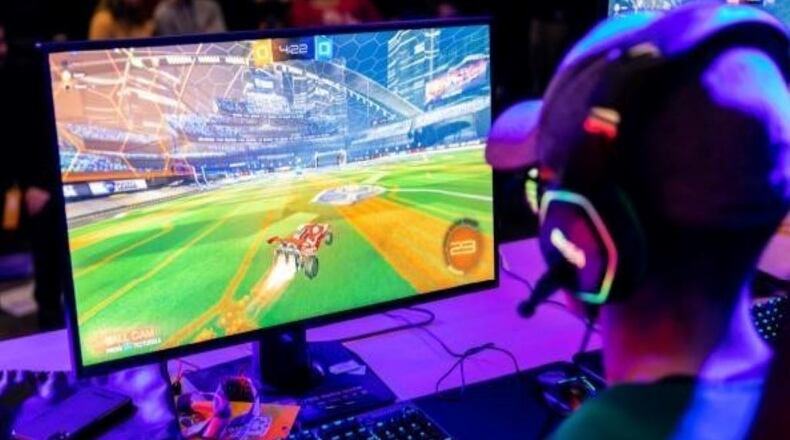It has been five years since the GHSA awarded the state’s first esports title in the fall of 2018, and since then the world of competitive esports has grown exponentially, locally and nationally.
Those who may have scoffed in the beginning when the GHSA added esports are seeing high-school participants take their talents to the college and professional levels.
Players are not the only beneficiaries.
Like any other major sporting event, there’s a support staff of highly motivated and talented individuals making things run. Possibilities include putting on esports events, filling audio and video needs and handling content creation on various platforms, such as YouTube, Twitch, TikTok and Instagram.
Consider: Since 2018, approximately 175 high schools in Georgia have begun to field esports teams under the GHSA banner. Many of those schools have multiple teams.
Despite the stigma from those who are unaware, it’s not just kids sitting in front of keyboards. The esports and video-games industry has become larger than the motion picture and music industry combined, and it is growing at a rapid rate.
So why should this be important at the high-school level? Three experts answer that question:
Darren Moore is the CEO of the Soniqs esports team, which fields professional teams for Rocket League, Rainbow Six Siege and PlayerUnknown’s Battlegrounds (PUBG). The Soniqs PUBG team of James Geizen (TGLTN), Tristan Nowicki (Shrimzy), Hunter Winn (hwinn) and Austin Scherff (M1ME) took home $1.3 million when it won the PUBG Global Invitational Series in 2021 in Incheon, South Korea. Moore also is the senior esports adviser at Harrisburg University in Pennsylvania and has a wealth of knowledge in the industry.
Ashley Hodge is a Super Coach for PlayVS (puts on GHSA esports championships) and helped build the Colquitt County esports program before taking over at Dodge County.
Daniel Searl is the head coach at Westminster and has helped lead the Wildcats to three esports state championships.
Moore: “The fact that we are actively going out and scouting talent for college has changed. The people we are getting in are close to playing professionally, sometimes, or had played professionally before. We are absolutely looking at unsigned or unknown talent, as well. Of our recruitment class this year, some are coming out of high school. We also offer, not just playing type of things, but esports management degrees, sports broadcasting … and we host the biggest collegiate competition for esports that is fully operated by our students. So it’s a great experience for them, getting that real-world experience that really is valuable for them and us. We are trying to attract people to Harrisburg who want to play video games, but also to align with the video-game world. … People should really start taking it seriously, because at the end of the day, esports is a growing industry. Its popularity isn’t waning.. … The great thing about esports is that there isn’t really a barrier to entry for anyone. You don’t need to be 6-foot-something and be athletic or whatever, and gender is irrelevant. Anyone and everyone can be involved in this activity.”
Westminster’s Searl: “Esports and video games, as a whole, drives more money and higher numbers than the film and music industry put together. That’s a staggering statistic, in my opinion. And just that alone should say schools at the high school or college level need to be investing in this industry. Because there are jobs; there’s money; there are opportunities, and there’s a multitude of available scholarship monies for esports. One of the current challenges are games like Fortnite or Valorant that are not supported by state high school associations because of the first person shooter aspect. So the scholarships at the college and even professional levels are for some of those games, which are not available at the GHSA high school level. But money for high school kids going to the college ranks is huge and growing. So that’s part of the future. But the biggest stigma to overcome is that it’s not just a kid sitting in a chair with a headset playing a game. It is every aspect of the industry where there are opportunities for high school and then college kids to find their way and find their place. The player (comes) first, but then there’s the event-management part. The ticketing, the show itself in the arena, then there’s the streaming component, and that’s a pathway like broadcasting camp. We do WCAT at Westminster. When are we going to start a Twitch Channel that will stream our games live like we do Friday night football?”
Dodge County’s Hodge: “I’ve been with PlayVS since ground zero, and it has just grown. Students are getting full scholarships to play esports. There are so many pathways to that amateur to professional circuit that you just didn’t have before. When it comes to broadcasting events, the Georgia Department of Education added an esports course onto a computer science course to teach how to broadcast an event, how to make graphics and even 3D printing of the trophies. It has grown and will only continue to grow. There are a lot of factors that I don’t think people think about in esports. At Colquitt, we had more support than at Dodge County … not in a bad way, just at Dodge I am taking over a program that existed and had fallen somewhat into disarray. But now they are paying me a stipend to coach, which is very exciting because that proves that esports is absolutely considered a sport alongside the others. But you don’t have to be an esports player to find success in the industry. From broadcasting to video editing to marketing or even teaching. The Georgia Film Academy just made an entire esports program, and they offer a certification that you would not have seen years ago.”
About the Author
The Latest
Featured

